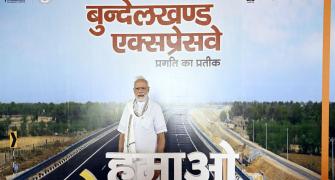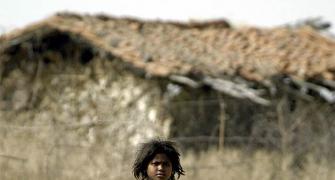'The Congress has, in the past, backed the demand but will not support it now since the SP opposes any division of UP.'

In a modest, time-worn office at Jhansi's Kacheri Chauraha, advocate Bhanu Sahay is all fire and brimstone at the incumbent Lok Sabha members from the Bundelkhand region. He accuses them of "reneging" on their commitment to champion the cause of a separate statehood.
Sahay, along with his associates of the Bundelkhand Nirman Morcha, firmly believes that the creation of a Bundelkhand state, comprising seven districts each from Uttar Pradesh and Madhya Pradesh, is the panacea for the region's problems -- water scarcity, poverty, lack of industrial development, and migration.
Ahead of the polling on May 20 for the four Lok Sabha seats in UP's Bundelkhand region -- Jhansi-Lalitpur, Hamirpur, Jalaun, and Banda -- the Morcha is campaigning fervently, urging voters to either reject three of the four incumbent MPs or opt for NOTA (none of the above) as a sign of protest.
The only one spared is Bharatiya Janata Party Hamirpur MP Pushpendra Chandel as he has consistently voiced the need to create a separate state of Bundelkhand since his tenure in the Lok Sabha began in 2014.
In Sarwan village, situated off the Jhansi-Babina road and some 23 km from the city, adopted by the local MP as part of the Sansad Adarsh Gram Yojana, villagers are sceptical about whether a separate Bundelkhand state would bring any tangible change to their lives.
They lament the inaccessibility of their public representatives (from the gram pradhan to the MP), the scarcity of water for irrigation, having to dig borewells 21 metres or even deeper to find water for their wheat and groundnut crops, the menace of stray animals threatening their crops, and the unreliable water supply from the Jal Jeevan Mission.
While power supply is sporadic, it has improved over time, and the availability of foodgrain under the Garib Kalyan Yojana is consistent.
The NITI Aayog's multidimensional poverty index-2023 indicates a substantial reduction in poverty in Bundelkhand since 2015-2016, marking one of the steepest declines in the country. However, the challenge Sarwan village now faces is not poverty, but unaddressed aspirations.
The village, with an electorate of 4,000, boasts four government-run higher secondary schools. In several courtyards, students are engrossed in coaching classes or group studies. Yet, villagers question the value of these efforts when government vacancies remain unfilled due to exams being scrapped because of paper leaks.
An elderly carpenter, who retired from the Indian Army in 2006, stresses Prime Minister Narendra Modi, and not the local MP, is the only reason his vote shall go to the BJP. "Look at the condition of the roads here. Some were repaired since elections are near," he says.
In Mahoba, 160 km from Jhansi, in the Hamirpur Lok Sabha constituency, betel leaf farmer Manoj Chaurasia expresses his dissatisfaction with Chandel. "I will vote for Modi, but he should give Bundelis a separate state," he asserts.
Ramsewak Chaurasia, a retired agriculture scientist, concurs: "The BJP has governments in MP, UP, and the Centre. If not now, then when?"
At Chhoti Chandrika temple, a group of cleaning staff attributes its support to Modi for free ration and Awas Yojana, but none specifically mentions the Ayodhya Ram temple.

One of the state's 13 'smart cities', Jhansi elected the BJP's Uma Bharti to the Lok Sabha in 2014 and Anurag Sharma, the managing director of Baidyanath Ayurved Bhawan and also the wealthiest candidate among those contesting on the 49 seats in phase five, in 2019.
Neither UP Chief Minister Yogi Adityanath nor MP Choef Minister Mohan Yadav broached the issue of a Bundelkhand province at their campaign rally, something Uma Bharti promised in Jhansi on April 14, 2014, as did Modi and Rajnath Singh that month, says Sahay, fuming at his Kacheri Chauraha office, furnishes documentary and video evidence of their respective speeches from a decade back. Neither did Congress leader Rahul Gandhi, who addressed a public meeting in Jhansi, along with Samajwadi Party chief Akhilesh Yadav.
"The Congress has, in the past, backed the demand but will not support it now since the SP opposes any division of UP," says Sahay. His associate, Ashok Saxena, nods in agreement and reminisces about how he disrupted the Lok Sabha proceedings as a 35 year old in 1995 by throwing pamphlets from the visitors' gallery to draw the country's attention to their demand.
Saxena claims to be the great-grandson of Kamta Prasad Saxena, the first chief minister of the short-lived Bundelkhand state, with its capital at Nowgong, in August 1948. It was first merged with Vindhya Pradesh and, in 1956, was split between Uttar Pradesh and Madhya Pradesh.
Saxena says he spent a day in the lock-up but escaped arrest when the BJP's Atal Bihari Vajpayee intervened. "Vajpayeeji pointed out that I was illegally detained inside the Parliament House complex overnight instead of being taken to a police station," Saxena recalls.
Interestingly, BJP MP Anurag Sharma is president of the Bundelkhand Ekikaran, or unification, committee. His father, Vishwanath Sharma, a two-term MP, once representing the Congress and the other time the BJP, was a leading light of the effort to demand a separate Bundelkhand state.
In 2011, then UP CM Mayawati proposed splitting the state into four parts, and she has revived that demand recently. "But her advocacy of the issue has little meaning. The BJP carved out Chhattisgarh, Uttarakhand, and Jharkhand. Why not Bundelkhand in Modi's third term?" asks Ramsewak Chaurasia, the agriculture scientist.











